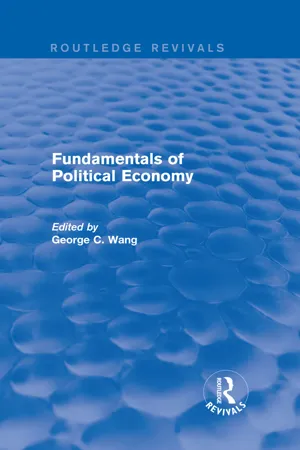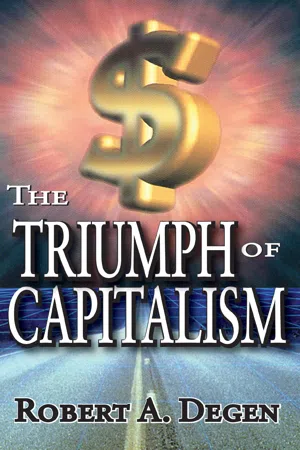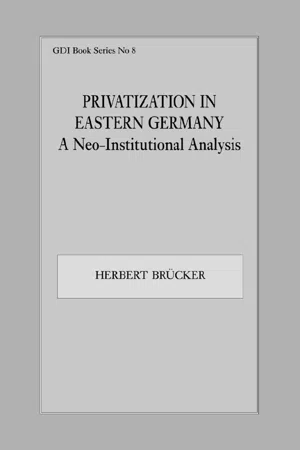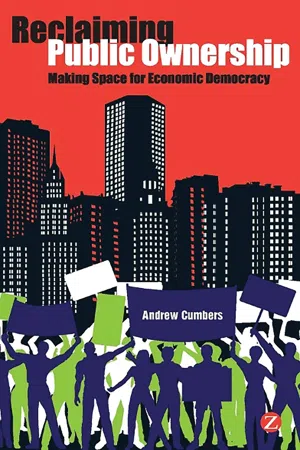Economics
Public Ownership
Public ownership refers to the state or government's ownership and control of resources, industries, or services. This can include public utilities, transportation systems, and natural resources. The primary goal of public ownership is to ensure that essential services are provided to the public and to prevent exploitation by private entities.
Written by Perlego with AI-assistance
Related key terms
4 Key excerpts on "Public Ownership"
- eBook - ePub
- Xiaohu (Shawn) Wang, K K Fung(Authors)
- 2017(Publication Date)
- Routledge(Publisher)
The replacement of capitalist private ownership by socialist state ownership represents a revolutionary leap in production relations. The socialist system of state ownership is a Public Ownership system in which both the means of production and the products are possessed by the proletarian state representing the whole laboring people. The appearance of the socialist system of state ownership shows that the liberated laboring people have not only become the ruling class of society, but have also become masters of the economy.In China, the scope of socialist state ownership includes mineral deposits, rivers, and territorial waters; forests, virgin land, and other natural resources designated to the state by law; and enterprises such as railways, postal and communications services, banks, state plants, farms, and commerce. As the representative of the whole laboring people, the state owns the means of production and sees that they are allocated rationally and in a unified manner. This creates a new situation in human history in which, for the first time, the national economy is systematically developed, and it paves the way for the development of social productive forces.The socialist state ownership system is a socialist Public Ownership system that conforms to the highly social nature of production. In modern industries, departments and enterprises are interconnected and mutually dependent. They are all integral organic constituents of the whole social production. The appearance of the socialist system of state ownership is an inevitable result of the contradiction between the highly social productive forces and capitalist private ownership in modern industries. Only with socialist state ownership can the contradictions between the social nature of production and the private ownership of the means of production in the capitalist society and the contradiction between the organized nature of production in individual enterprises and the chaotic nature of production in the whole society be resolved; only thus can the serious waste and destruction of productive forces and products due to the capitalist system and the extravagant waste practiced by the bourgeoisie and its political representatives be eliminated. The large quantities of the means of production and products thus saved for the whole society can be used to promote a more rapid development of the productive forces. - eBook - ePub
- Robert Degen(Author)
- 2017(Publication Date)
- Routledge(Publisher)
The New Shorter Oxford English Dictionary , is “a political and economic theory or policy of social organization which advocates that the community as a whole should own and control the means of production, capital, land, property, etc.” Such a definition is archaic for it deals with only one facet of a set of ideas and practices that constitute modern socialism. Certainly it was the core idea of those intent on evicting capitalism in the early days of socialist thought when capitalism was condemned in toto. According to Marxist doctrine, it is private ownership of capital and land that enables the capitalist class to exercise political control over society. Once social ownership of these resources is achieved, the working class majority of the population would have the means to control the state.Public Ownership increased to a very limited extent before World War I in capitalist Britain. Nationalization was carried out by the conservative government of Prime Minister Disraeli in 1868 when the Post Office (a government monopoly since the seventeenth century) was authorized to purchase the country’s telegraph companies.1 In 1903, after decades of very unsatisfactory service by London water companies that included water famines, the companies were municipalized.The major twentieth century drive for Public Ownership in Britain culminated in the nationalization of “key” industries by the Labour government of 1945-1951. Created by Parliament, the ultimate authority over them, the public corporations were structured to be run by largely independent boards under the supervision of government ministers. The three levels of control and oversight resulted in uncertainty and occasional conflict, a problem inherent in the fact that both social and commercial objectives were involved. If the results that followed had been more successful, other industries would likely have been added to the roster, but Labour did not again form a government until 1964 and by then much of the luster had worn off nationalization. As early as 1953, a proposal at a party conference to commit the party to additional nationalization was scotched when the general secretary of the Transport and General Workers Union threw its great weight of votes against the resolution. Following its election defeat in 1959, the Labour Party, while still advocating additional state ownership, toned down this goal in practice. Nationalization of the means of production, distribution, and exchange was still a principle to which the Labour Party was committed when it held office from 1964 to 1970, but it ceased to rank as a major objective in its legislative program. It simply did not have strong electoral appeal. While in opposition in the early 1970s, Labour did take an interventionist posture that included more nationalization to improve the country’s weak economic performance, but when the party was in office from 1974 to 1979, additional nationalization was not pursued. - eBook - ePub
Privatization in Eastern Germany
A Neo-Institutional Analysis
- Herbert Brücker(Author)
- 2005(Publication Date)
- Routledge(Publisher)
With the development of the various approaches of the New Institutional Economics, above all the theories of property rights, transaction costs, and agency costs, neoclassical microeconomics was expanded to include information costs and transaction costs, and thus opened up to an analysis of institutional phenomena (Furubotn/Richter 1991; Williamson 1990, 71; Eggertsson 1991). The approaches of the New Institutional Economics are here supplemented by developments in game theory made during the past two decades. Game theory has created a formal apparatus that can be used in particular to examine the problem of imperfect and asymmetrically distributed information in institutions (Fudenberg/Tirole 1992). Seen in terms of these theories, the incentive and sanction structure of different forms of ownership has a significant influence on the economic behavior of individuals and economic institutions. Ownership has thus become a relevant category for explaining economic activity.This chapter will discuss the theoretical arguments in favor of the institutionalization of a regime of private ownership and the privatization of the state economic sector. For analytical reasons, two factors are separated in discussing the issue of ownership: the question of coherence and the question of efficiency of economic systems with private and public regimes of ownership. Different theories are drawn upon here to deal with these two issues: the issue of the coherence of economic systems cannot be settled within the Walrasian theoretical tradition, which is indifferent toward the institutional foundations of an economic system. For this reason, János Kornai’s theory of shortage has been selected here as a starting point for the discussion of the systems problem; Kornai’s theory is concerned with the question of the institutional conditions of the microeconomic coherence of economic systems. The discussion then goes on to consider the role of ownership for the coherence of reform and transformation strategies in the transition countries (2.1).The efficiency problem stands in the center of the historical debate on economic accounting in socialism. While Friedrich Hayek and Ludwig von Mises, two representatives of the Austrian School, disputed the possibility of efficient allocation in an economic system whose means of production have been nationalized, a number of socialist economists, using the tools of Walrasian equilibrium theory, have sought to prove that a socialist economy can achieve Pareto-optimal allocation. At the heart of this theoretical and ideological dispute is the question of whether, within the framework of a static theory that abstracts from all information and incentive problems, it is possible to deal meaningfully with the problem of ownership (2.2 - eBook - ePub
Reclaiming Public Ownership
Making Space for Economic Democracy
- Professor Andrew Cumbers(Author)
- 2012(Publication Date)
- Zed Books(Publisher)
PART ONE Public Ownership and its discontentsPassage contains an image
1 | Public Ownership as state ownership: the post-1945 legacy
What this war has demonstrated is that private capitalism – that is, an economic system in which land, factories, mines and transport are all privately owned solely for profit – does not work. It cannot deliver the goods. (Orwell 1982 [1941] : 73)Introduction
In late July 1945, as the Second World War drew to a close, the British people rejected their wartime leader, Winston Churchill, and his Conservative Party and presented the Labour Party with a historic landslide victory and its first ever majority government. Under the new prime minister, Clement Attlee, Labour embarked upon the most radical and left-wing programme of economic reform of any British administration in history. With its commitment to tackle the poverty, deprivation and unemployment that had plagued the country in the years before war, Attlee’s government embarked upon massive and unprecedented levels of state intervention in the economy. The centrepiece was an extensive programme of nationalization to take key sectors of the economy away from the oligopolistic private interests that the Labour Party and its supporters viewed as responsible for the economic anarchy of the interwar years.The great inter-war slumps were not acts of God or of blind forces. They were the sure and certain result of the concentration of too much economic power in the hands of too few men. These men had only learned how to act in the interest of their own bureaucratically-run private monopolies which may be likened to totalitarian oligarchies within our democratic State. They had and they felt no responsibility to the nation. (Labour Party 1945
Learn about this page
Index pages curate the most relevant extracts from our library of academic textbooks. They’ve been created using an in-house natural language model (NLM), each adding context and meaning to key research topics.



